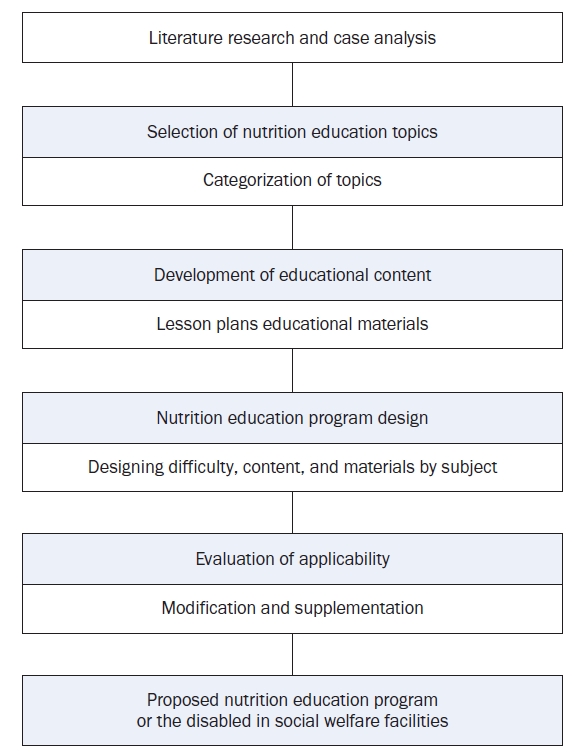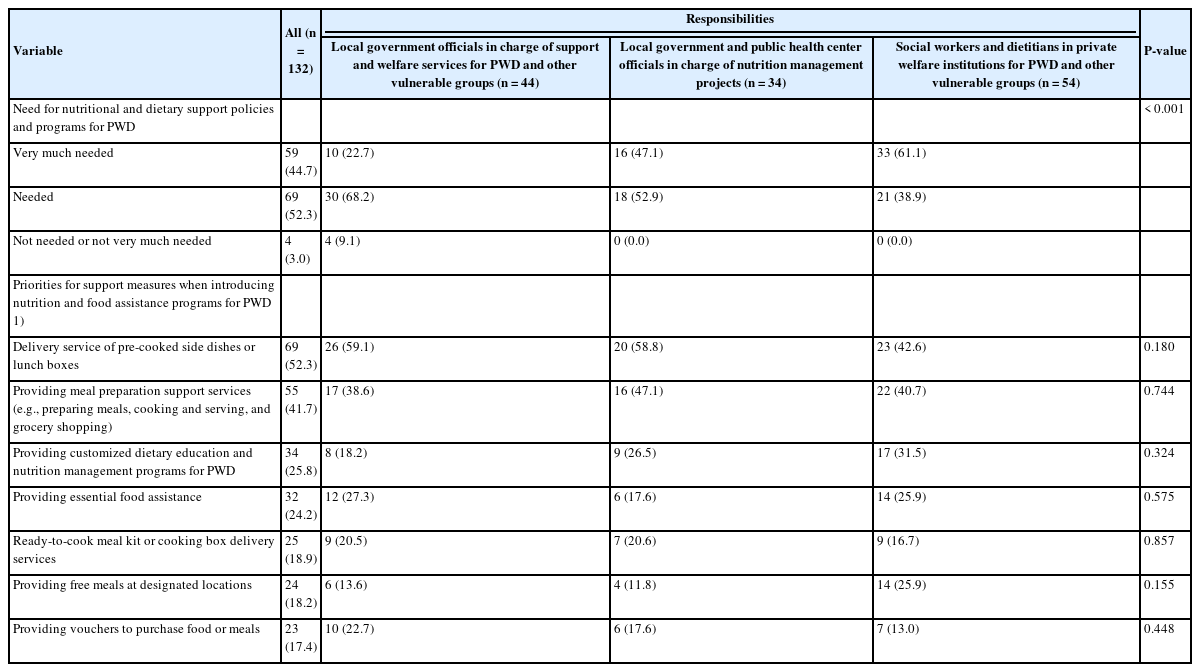Search
- Page Path
- HOME > Search
Research Articles
- [Korean]
- Development and applicability evaluation of a nutrition education program for residents and users of disability social welfare facilities in Korea: a mixed-methods study
- Jin-kyung Kim, Kyoung-min Lee, Min-sun Jeon
- Korean J Community Nutr 2025;30(1):64-74. Published online February 28, 2025
- DOI: https://doi.org/10.5720/kjcn.2025.00017

-
 Abstract
Abstract
 PDF
PDF - Objectives
This study aimed to develop a nutrition education program based on social cognitive theory to promote the health of individuals using facilities for people with disabilities. It also sought to evaluate the applicability of the educational materials through assessments by counselors at the Social Welfare Food Service Management Support Center.
Methods
A group of six experts developed the program based on a needs assessment of nutrition education in facilities for individuals with disabilities. Applicability was evaluated through an online survey of 26 counselors from Social Welfare Food Service Management Support Centers nationwide in July 2023, and the results were analyzed.
Results
The nutrition education program includes a basic course on personal hygiene, dining etiquette, picky eating prevention, and obesity management. The advanced course covers dietary management for chronic diseases, such as meal planning for hypertension, diabetes management, and dietary principles for dysphagia. Additionally, lecture PPTs, individual activity sheets, and experiential teaching aids were developed. Applicability evaluations showed high scores, with the teaching-learning plan and PPT averaging 4.15 and the experiential teaching aids scoring 4.17, all above 4.0.
Conclusion
This study developed a nutrition education program for individuals with disabilities and assessed its applicability and usability. Implementing this program in disability welfare institutions could enhance health promotion and improve the quality of life for individuals with disabilities. -
Citations
Citations to this article as recorded by- Development of a standard nutrition management model algorithm for personalized care in social welfare facilities for the disabled
Su-Jin Lee, Ji-Won Kang, Sil Ah Kim, Kirang Kim, Sohyun Park, Jieun Oh, Hyunjoo Ryou, Ji-Yun Hwang
Journal of Nutrition and Health.2025; 58(5): 498. CrossRef
- Development of a standard nutrition management model algorithm for personalized care in social welfare facilities for the disabled
- 2,830 View
- 81 Download
- 1 Crossref

- [Korean]
- The needs and prioritization of nutrition and dietary support for individuals with disabilities: an exploratory study
- Jong Eun Park, Yu Jin Kim, So Young Kim, Jong Hyock Park
- Korean J Community Nutr 2024;29(5):431-443. Published online October 31, 2024
- DOI: https://doi.org/10.5720/kjcn.2024.00009

-
 Abstract
Abstract
 PDF
PDF - Objectives
Based on a survey of officers, social workers, and dietitians involved in managing nutrition and welfare policies or projects for vulnerable groups in local governments or private welfare institutions, this study aimed to assess the need for nutritional and dietary support policies and programs for persons with disabilities (PWD), as well as to identify appropriate support measures. Methods: An online survey was conducted from March 2 to 15, 2021. The survey included 20 questions exploring perspectives on the nutritional status of PWD, their need for nutritional and dietary support policies and programs, and the prioritization of appropriate support measures. A total of 132 responses were analyzed. Results: Approximately 68.9% of the respondents rated the nutritional status of PWD as “bad” or “very bad.” A substantial number identified “difficulty in purchasing ingredients, cooking, and preparing meals independently due to disability,” and “limited knowledge about nutrition and recipes necessary for maintaining a healthy and balanced diet” as the primary challenges in the dietary and nutritional management of this population. Additionally, 97.0% of the respondents deemed that the introduction of nutritional and dietary support policies and programs for PWD was “needed” or “very much needed.” Priority strategies to implement and strengthen these policies and systems included the “development of customized programs and services tailored to the needs and demands of the target population” and the “establishment of a dedicated department with specialized personnel.” Conclusion: Comprehensive nutritional and dietary support policies and programs should be actively implemented to ensure a healthy and stable diet for PWD, tailored to meet their actual needs and demands. -
Citations
Citations to this article as recorded by- Development of a standard nutrition management model algorithm for personalized care in social welfare facilities for the disabled
Su-Jin Lee, Ji-Won Kang, Sil Ah Kim, Kirang Kim, Sohyun Park, Jieun Oh, Hyunjoo Ryou, Ji-Yun Hwang
Journal of Nutrition and Health.2025; 58(5): 498. CrossRef - Factors associated with nutritional risk among disabled persons in the Republic of Korea: a cross-sectional study using 2020 Disability and Life Dynamics Panel
Seong-Ah Kim, Seul Ki Choi
Korean Journal of Community Nutrition.2025; 30(5): 364. CrossRef
- Development of a standard nutrition management model algorithm for personalized care in social welfare facilities for the disabled
- 2,840 View
- 125 Download
- 2 Crossref

- [English]
- Nutrition education programs necessary for social welfare facilities for persons with disabilities: a cross-sectional study
- Jinkyung Kim, Min-Sun Jeon
- Korean J Community Nutr 2024;29(1):1-15. Published online February 29, 2024
- DOI: https://doi.org/10.5720/kjcn.2024.29.1.1
-
 Abstract
Abstract
 PDF
PDF - Objectives
This study investigated the need for nutrition education aimed at improving the health of residents and users of social welfare facilities for persons with disability and aimed to provide basic information for developing a nutrition education program that meets the needs of the field.
Methods
Altogether, 249 employees working in social welfare facilities for people with disabilities were included in the study. Data on the health status of residents/users, meal management, nutritional education, nutritional education needs, and awareness of nutritional education were obtained through online surveys. A descriptive analysis was conducted to analyze the demographic characteristics, needs, and perceptions of the respondents, and independent t-tests and χ2 tests were performed to analyze and compare the differences between residential and daycare facilities.
Results
The majority of residents/users of social welfare facilities for persons with disabilities have developmental disabilities. When educating residents with residents/users of social welfare facilities, ‘personal hygiene’ was the most necessary topic, followed by ‘obesity management’ education. Regarding the methods of providing education, face-to-face lectures demonstrated a high demand. They responded that when nutrition education experts provide nutrition education to people with disabilities, they must understand ‘the physical characteristics of persons with disabilities’ and have the ability to determine appropriate nutrition for such people. The most appropriate nutrition program training would be twice a year, lasting 30 min to 1 h per training session.
Conclusions
It will present a direction for operating a nutrition education program for persons with disabilities that meets their needs of social welfare facilities and ultimately contribute to the establishment and activation of nutrition education tailored to welfare facilities for such individuals in Korea. -
Citations
Citations to this article as recorded by- Development and applicability evaluation of a nutrition education program for residents and users of disability social welfare facilities in Korea: a mixed-methods study
Jin-kyung Kim, Kyoung-min Lee, Min-sun Jeon
Korean Journal of Community Nutrition.2025; 30(1): 64. CrossRef
- Development and applicability evaluation of a nutrition education program for residents and users of disability social welfare facilities in Korea: a mixed-methods study
- 2,702 View
- 44 Download
- 1 Crossref


 KSCN
KSCN

 First
First Prev
Prev



